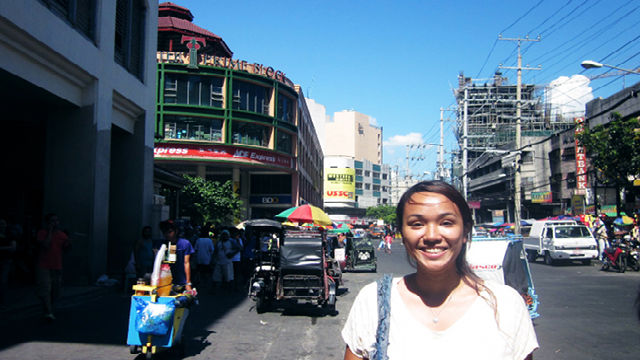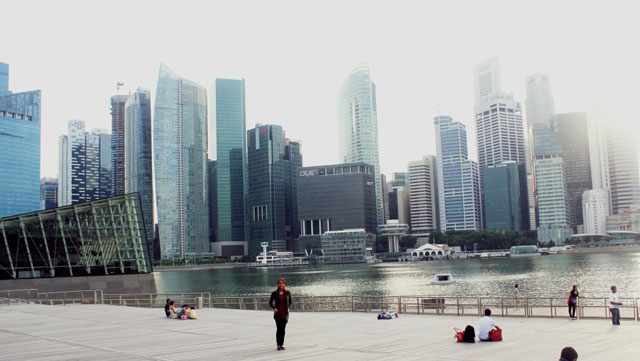SUMMARY
This is AI generated summarization, which may have errors. For context, always refer to the full article.

SINGAPORE – Last year, I was bemused by how I felt more Filipino in Singapore than back in the Philippines.
Given that I am a “foreign Filipina” born in Indonesia and attended an international high school, I was excited about Singapore. I knew it to be a cosmopolitan city of Chinese, Malays, Indians and foreigners that could teach me about other cultures.
After all, globalism is finding the common thread among different races. Moving abroad was the perfect opportunity to assimilate and localize a new way of living.
But for a while I was confused.
I didn’t expect moving abroad would first shed light about how Filipino I was before connecting the dots with other nationalities.
I didn’t have to speak Tagalog fluently or discuss Philippine politics or history to brand myself a Filipino. Understanding the issue of Filipino identity became more of a practical matter.
Rather than attempting to discover Filipino identity, which is what being Filipino meant when I still lived back home, living abroad actually brought out the Filipino in me without my even trying too hard.

‘Filipinoisms’
In Singapore where rules are strictly enforced, it’s the Filipino who thinks twice about crossing the street on a red light. Yet it’s the same Filipino who will most likely not practice it when back home.
In Singapore, where complaints about train delays are common, Filipinos will have the patience to smile about them. We are used to relentless traffic on EDSA as our resilience stems from surviving bigger struggles like poverty and natural disasters.
In Singapore, a global hub for professionals, Filipinos are in the habit of saying, “I’m sorry” a lot when they don’t have to.
In Singapore, a country with a strong and strict work ethic, I’ve learned that skills can be developed, but compassion can never be taught, which is what I’m thankful for about Filipino culture. Imagine the double-threat we can be if we can harness both traits.
In Singapore, or any other country we migrate to, our lifestyle changes.
The collectivist culture that characterizes most Asian countries breeds a brand of independence that’s rooted in our parents and helpers, and grows with interdependence.
Usually full independence isn’t granted until Filipinos are much older, so our lack of domestic skills — cooking, cleaning and doing laundry, on top of financial illiteracy, become more apparent when living abroad.
Newborn expats from the upper-middle class might Google “how to remove stains from color bleeding” and “how to declog your toilet or shower without yaya.” The Philippines may be a third world country but you can appreciate how home can spoil you when you don’t have to pay for rent.
Indeed I’ve realized that we need contrast to see the fine lines outlining who we are. The exposure abroad makes us hyper-aware of the strengths and weaknesses born out of Filipino culture—traits we can leverage and work on to become better Filipinos, to compete in the globalized economy, learnings we can take for those of us who pay it forward when we move back home.
The bigger picture
The exposure abroad also provides a larger common denominator among Filipinos of various backgrounds. By taking a step back and seeing the bigger picture, trivialities such as language, geography, skin, and socio-economic class become less important.
This Filipino connection became apparent when I attended the event of an NGO where I volunteer. I was listening to a domestic worker speak about the struggles of working in Singapore.
Despite the difference in our educational and economic background I could relate to the tentativeness of our work permit to the stereotypes we need to challenge. Plus, we both left Manila in pursuit of a promising future. Our suitcases are heavy with the stories that brought us to Singapore—chapters worth of family, friends, and dreams.

The modern day Filipino
Now that it’s easier to travel, work or study abroad, I’m excited about the exposure Filipinos will get at a younger age.
Unlike before when third culture kids (TCKs) were born from the circumstances of where their parents were based, the new generation will be globalized and localized as an offshoot of choosing to move abroad.
I believe it’s the overseas Filipino workers, expats and “foreign Filipinos” alike who will till the future of the Philippines, not only on remittances, but with a better understanding of who we are and can be as a country.
It’s been a year since I left Manila. Indeed I still feel more Filipino abroad than I do back home but I use that point of view to my advantage.
Here I’ve realized it is less about finding your Filipino identity but embracing how the underlying cultural DNA brought you up as one. It’s about appreciating the nuances and values that differentiate you from the rest of the world. – Rappler.com
Add a comment
How does this make you feel?
There are no comments yet. Add your comment to start the conversation.